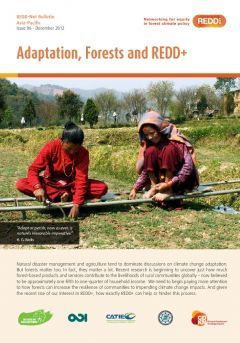Location
RECOFTC
RECOFTC is derived from an abbreviated form of the organization's legal name, Regional Community Forestry Training Center for Asia and the Pacific. Formerly the organization was known as RECOFTC – The Center for People and Forests.
RECOFTC – The Center for People and Forests is an international not-for-profit organization that focuses on capacity building for community forestry in the Asia Pacific region. It advocates for the increased involvement of local communities living in and around forests - some 450 million people in Asia-Pacific - in the equitable and ecologically sustainable management of forest landscapes.
The Regional Community Forestry Training Center for Asia and the Pacific (RECOFTC) opened in Bangkok, Thailand, in March 1987 with support from the United Nations Food and Agriculture Organization, the Government of Switzerland (through the Asian Development Bank), and Thailand's Kasetsart University.
Community forestry is widely acknowledged as a powerful solution for many of the challenges facing local people and the wider society, especially in improving rural livelihoods, enhancing community governance and empowerment, transforming forest-related conflict, protecting and enhancing the environment, and helping to fight climate change. As a capacity-building organisation, RECOFTC improves the ability of people and organisations to conduct community forestry effectively and sustainably.
RECOFTC works toward its mission through four thematic areas:
- expanding community forestry
- people, forests and climate change
- transforming forest conflict
- securing local livelihoods.
Members:
Resources
Displaying 291 - 295 of 485REDD-Net Asia-Pacific Bulletin #5: Drivers of Deforestation and REDD+
What do opportunity costs mean in the context of REDD+ and what are the implications for local communities? Farmers intuitively know the importance of opportunity costs. To tackle deforestation in a socially equitable way, we must consider what the drivers of deforestation are and what incentives and livelihood opportunities accompany them.
REDD-Net Asia-Pacific Bulletin #5: Drivers of Deforestation and REDD+
What do opportunity costs mean in the context of REDD+ and what are the implications for local communities? Farmers intuitively know the importance of opportunity costs. To tackle deforestation in a socially equitable way, we must consider what the drivers of deforestation are and what incentives and livelihood opportunities accompany them.
REDD-Net Asia-Pacific Bulletin #5: Drivers of Deforestation and REDD+
What do opportunity costs mean in the context of REDD+ and what are the implications for local communities? Farmers intuitively know the importance of opportunity costs. To tackle deforestation in a socially equitable way, we must consider what the drivers of deforestation are and what incentives and livelihood opportunities accompany them.
REDD-Net Asia-Pacific Bulletin #6: Adaptation, Forests and REDD+
Natural disaster management and agriculture tend to dominate discussions on climate change adaptation. But forests matter too. In fact, they matter a lot. Recent research is beginning to uncover just how much forest-based products and services contribute to the livelihoods of rural communities globally – now believed to be approximately one-fifth to one-quarter of household income. We need to begin paying more attention to how forests can increase the resilience of communities to impending climate change impacts.
REDD-Net Asia-Pacific Bulletin #6: Adaptation, Forests and REDD+
Natural disaster management and agriculture tend to dominate discussions on climate change adaptation. But forests matter too. In fact, they matter a lot. Recent research is beginning to uncover just how much forest-based products and services contribute to the livelihoods of rural communities globally – now believed to be approximately one-fifth to one-quarter of household income. We need to begin paying more attention to how forests can increase the resilience of communities to impending climate change impacts.



